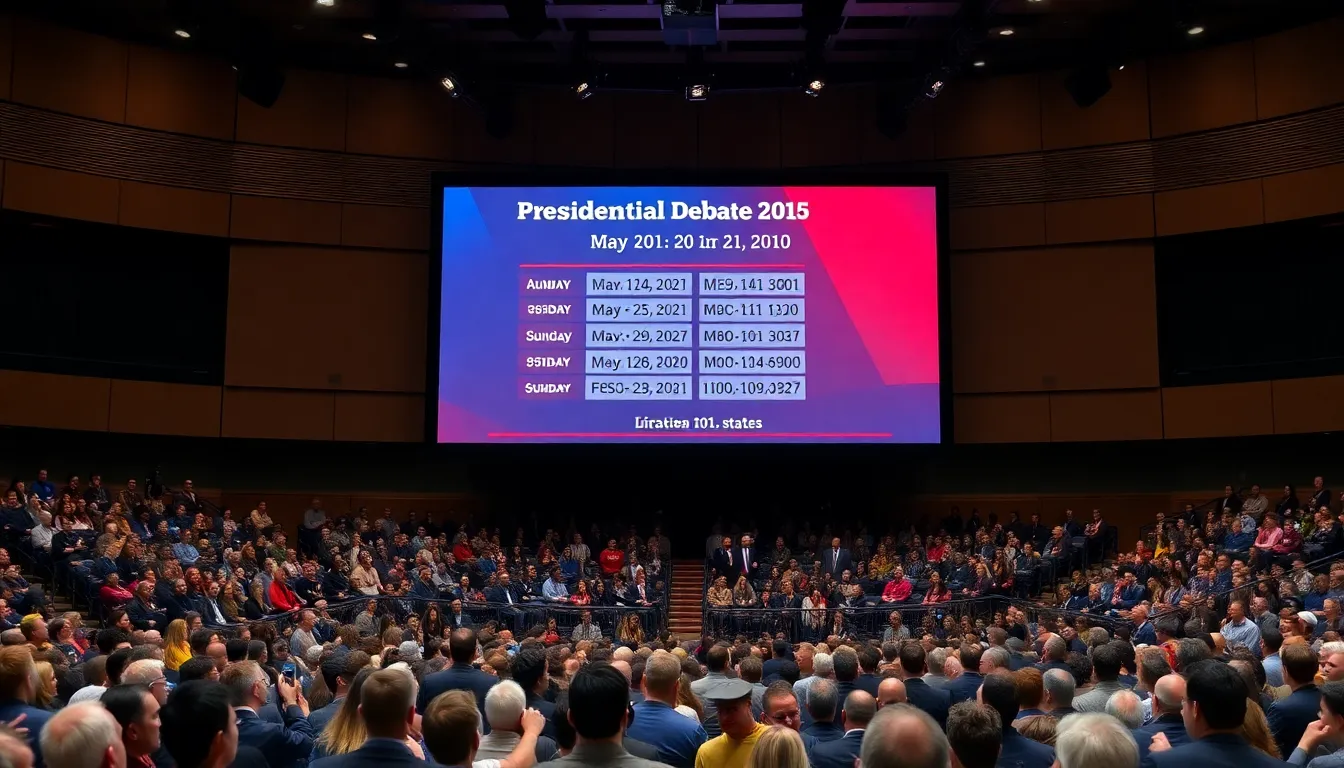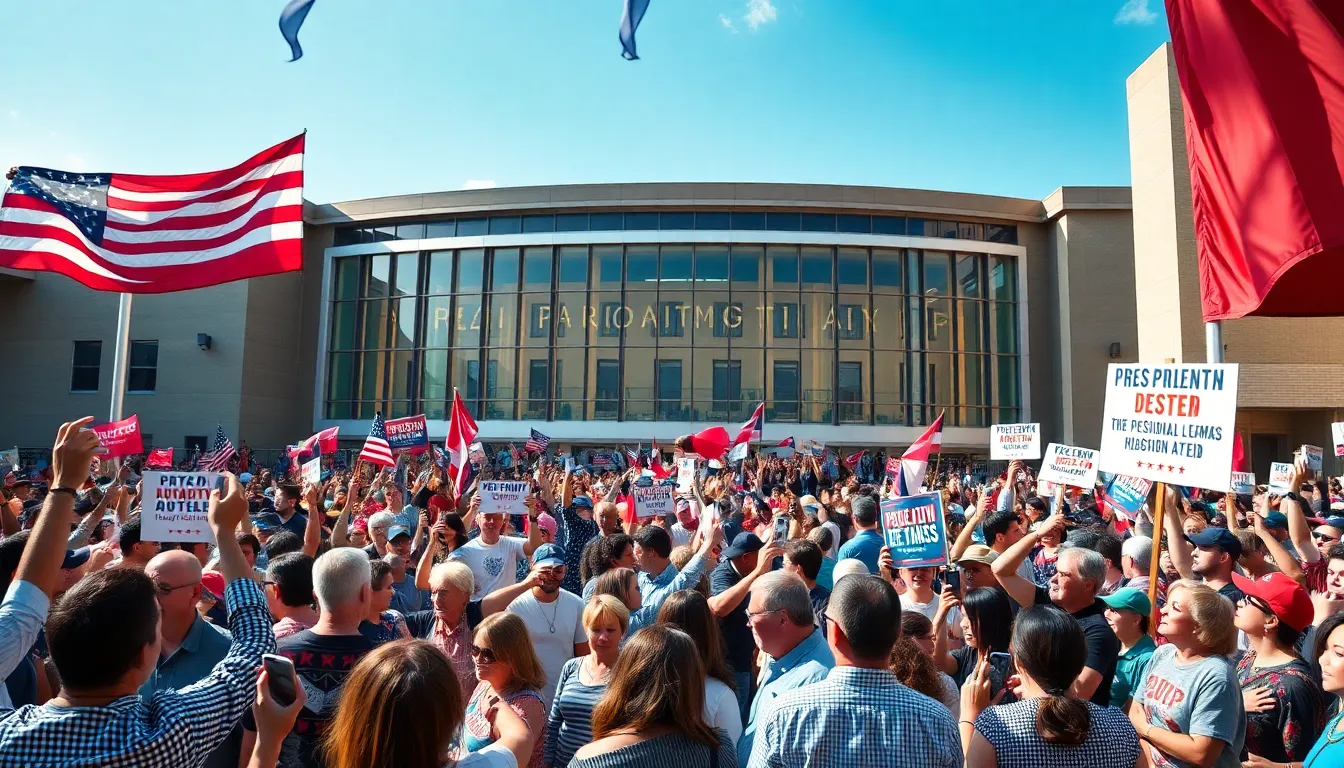Table of Contents
ToggleAs the election season heats up, anticipation builds for one of the most important events in American politics: the presidential debate. These debates offer a platform for candidates to present their visions, challenge each other’s policies, and engage directly with voters. With the stakes higher than ever, knowing the date of the presidential debate is crucial for anyone wanting to stay informed.
Mark your calendars and prepare for a night of insightful discussions and heated exchanges. The debates play a significant role in shaping public opinion and influencing undecided voters. As the nation gears up for this pivotal moment, understanding when it takes place can help ensure that everyone is ready to tune in and witness the candidates in action.
Overview of Presidential Debates
Presidential debates serve as key components of the electoral process in the United States. They provide candidates platforms to present their policies and engage directly with one another. Voters gain insights into each candidate’s positions on various issues, making debates essential for informed decision-making.
Debates typically occur in the general election phase and feature the major party nominees. These events often cover topics such as the economy, healthcare, foreign policy, and social issues. Historically, debates have transformed public perception and influenced election outcomes. For instance, the 1960 debate between John F. Kennedy and Richard Nixon showcased the impact of televised debates on voter sentiment.
Organizations like the Commission on Presidential Debates oversee the format and logistics of these events. They allocate time for opening statements, questions from moderators, and rebuttals, ensuring a structured discussion. Viewers can expect a blend of serious discourse and potential conflicts as candidates defend their views against challengers. Engaging in debates helps candidates establish their presence in the race, appealing to undecided voters.
Understanding when and where debates occur remains crucial for those looking to follow the election closely. Each debate not only highlights candidates’ approaches but also reveals their ability to perform under pressure, impacting public opinion and electoral outcomes significantly.
Key Dates for Upcoming Presidential Debates

Knowing the exact dates of the presidential debates is essential for voters and political enthusiasts. Here are the key scheduled dates for the upcoming debates.
First Presidential Debate Date
The first presidential debate is set for September 26, 2024. This debate will offer candidates a platform to present their initial positions and engage in direct discussions with their opponents.
Second Presidential Debate Date
The second presidential debate will take place on October 10, 2024. This event typically allows candidates to address key issues raised in the first debate and respond to critiques.
Third Presidential Debate Date
The third presidential debate is scheduled for October 24, 2024. This final debate often serves as a critical opportunity for candidates to solidify their messages and connect with undecided voters before the election.
Importance of Presidential Debates
Presidential debates play a critical role in shaping the electoral landscape, offering candidates a chance to communicate their visions while directly engaging with one another. These events not only inform voters but also stimulate political discourse.
Impact on Voter Decisions
Debates significantly influence voter decisions. Candidates’ performances during these events can shift public perception, particularly among undecided voters. Polling data often shows spikes in candidate support following strong debate performances. For instance, after the first presidential debate in 2016, one candidate experienced a notable rise in approval ratings. Voters assess candidates’ positions on issues such as healthcare and the economy, often swayed by rhetoric and delivery.
Historical Significance
Presidential debates hold historical significance in U.S. elections, marking pivotal moments in political campaigning. The 1960 debate between John F. Kennedy and Richard Nixon set a precedent, showcasing the impact of visual appeal alongside policy discussions. Subsequent debates have influenced election outcomes, underscoring the importance of candidates’ communication skills and public engagement. Notable examples include Ronald Reagan’s command in 1984 and Barack Obama’s performance in 2008, both of which propelled their campaigns forward, demonstrating the power of effective debate strategies.
How to Prepare for Watching the Debates
Preparing for the presidential debates enhances the viewing experience and provides deeper insight into candidates’ positions.
- Research Candidates’ Backgrounds: Understanding candidates’ political histories, key policies, and public statements strengthens the ability to analyze their performances.
- Familiarize with Key Issues: Identifying the core issues that will likely be discussed—such as the economy, healthcare, and foreign policy—prepares viewers for critical analysis of candidates’ answers.
- Gather Debate Resources: Utilize reputable news outlets and official candidate websites to access background information, analysis, and real-time coverage.
- Set Up Viewing Arrangements: Ensure a comfortable viewing area with a reliable screen and sound system. Organize a group of friends or family for a more engaging discussion during and after the debate.
- Engage on Social Media: Follow hashtags and participate in live discussions to connect with other viewers. Observing diverse opinions can provide a broader understanding of candidate performances.
- Take Notes During the Debate: Documenting responses, key points, and personal reactions offers a reference for evaluating candidates post-debate. This practice aids in remembering specific claims and arguments presented.
- Prepare for Post-Debate Analysis: Plan to watch news coverage or analysis after the debate. Expert commentary can shed light on candidates’ performances and the immediate public reactions.
- Reflect on Personal Voting Priorities: Define personal values and priorities beforehand. Comparing these with candidates’ positions during the debate can clarify alignment and potential voting decisions.
The upcoming presidential debates promise to be pivotal moments in the electoral process. With key dates set for September 26, October 10, and October 24, 2024, voters have a prime opportunity to engage with the candidates and their platforms. These debates will not only showcase differing viewpoints but also serve as a litmus test for voter sentiment.
As the election approaches, staying informed about these events is crucial. Preparing for the debates can enhance understanding and appreciation of the candidates’ positions. Whether it’s through research or thoughtful discussion, engaging with the debates will empower voters to make informed choices come election day.





